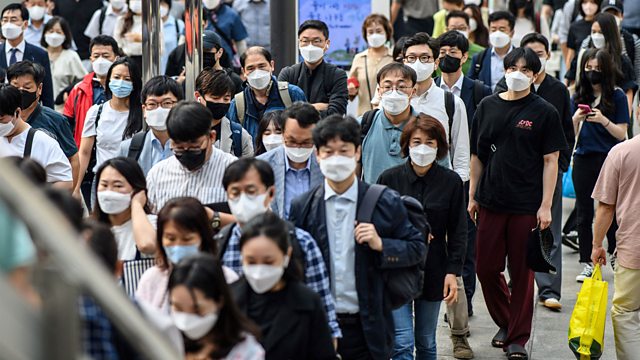Sleepless in Seoul: South Korea's Exhausted Workforce
South Korea's exhausted workforce, Ethiopia's social media battles, plus the Iran nuclear talks, regeneration in Naples, and poverty-hit Venezuelans trying to celebrate Christmas.
This year's surprise international television success is the dystopian South Korean series, Squid Game, which imagines people competing in a series of ever more violent contests, hundreds dying along the way. The show is a shameless satire on the cut-throat competitiveness of ordinary South Korean life; some characters explicitly state they are taking part in the tournament because it is no worse than how they were living anyway. When Chloe Hadjimatheou went to South Korea recently, she could see what the programmeβs creators were getting at.
It is not just the death toll in Ethiopia that is so disturbing but also the manner by which many people are dying: civilians have been murdered in ethnically-based violence, while others have starved. Both sides have accused the other of committing atrocities, while denying any carried out by their own people. This war-of-words is being played out on social media with just as much fervour as the physical war on the ground. Our correspondent, Andrew Harding, found himself caught in the middle.
Negotiations over Iranβs nuclear programme were never going to be easy, but the two sides cannot even agree how to start. China, Russia, the UK and US are among those with teams in Vienna, hoping to persuade Iran to stop what they believe is an attempt to develop nuclear weapons. That would mean they cease enriching uranium towards the level required to make a warhead or bomb. However, the Iranians don't want to discuss this until sanctions imposed on their country are lifted. James Landale warns this presents a serious challenge to the chances of a deal being reached.
Nobody is sure who first came up with the suggestion that one could βSee Naples and die.β Nor is it even clear whether that counts as a recommendation or a warning. But if the quote caught on, that is perhaps because it sums up the dark associations many have with the biggest city in Italyβs deep south: less economically developed than its northern counterparts, and affected by all kinds of travails, from earthquakes to mafia violence. The neighbourhood of Sanita is among the city's most deprived, but locals have used a famous church there as the centre for a whole series of regeneration programmes. Mark Stratton was shown around.
There are still question marks over how Christmas will be celebrated this year β whether new restrictions might need to be imposed, because of the Omicron variant of the Coronavirus, or even a lockdown. In some countries though, it was already clear long ago that the Christmas period would provide little opportunity for celebrating. In Venezuela, three quarters of the population are now living in extreme poverty, living on less than two pounds a day. Yet as Katy Watson explains, Venezuelans do really like Christmas, and are making greats effort to mark the festive season, even with their circumstances so straitened.
Last on
Broadcast
- Sat 4 Dec 2021 11:30ΒιΆΉΤΌΕΔ Radio 4

